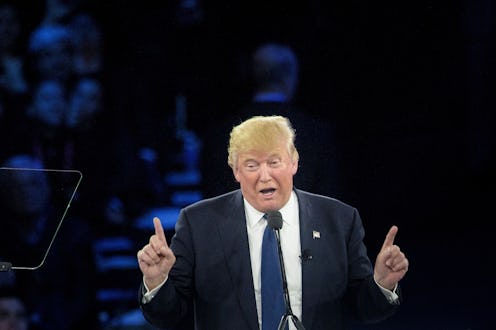News
What One Former Trump Super PAC Staffer Claims
Former Trump super PAC staffer Stephanie Cegielski has news for the "silent majority": Donald Trump doesn't actually want to be your president. In a hard-hitting article written by a former strategist for the Make America Great Again super PAC, Cegielski claims that Trump never intended to be the party frontrunner, which she claims was revealed to her before she was even hired. Hope Hicks, spokesperson for the Trump campaign, said that Cegielski worked for a super PAC that Trump has disavowed and said that she "knows nothing about Mr. Trump or the campaign and her disingenuous and factually inaccurate statements in no way resemble any shred of truth."
In an open letter directed to Trump supporters, Cegielski wrote, "Almost a year ago, recruited for my public relations and public policy expertise, I sat in Trump Tower being told that the goal was to get The Donald to poll in double digits and come in second in delegate count." According to Cegielski, Trump's campaign was intended as a "protest candidacy," fueled by a "desire to rank second place to send a message to America and to increase his power as a businessman."
But Cegielski also claims that this isn't the good news that some Trump opponents may think it is. Now that he's come this far, Trump has no intention of quitting: "He certainly was never prepared or equipped to go all the way to the White House, but his ego has now taken over the driver's seat, and nothing else matters ... The Donald does not fail." Cegielski, who ended her involvement with the Trump super PAC when it closed in October, didn't cite any sources from within the campaign leadership to support her claim, but Snopes was able to confirm that she worked for the Make America Great Again PAC in 2015.
Cegielski's article is a seeming confirmation of rumors that circulated in the early days of the Trump campaign. The Washington Post's political blog The Fix published an article back in June that opened with skepticism exactly along the lines of Cegielski's claims. "What if Donald Trump doesn't want to win the presidency?" postulated writer Philip Bump. "What if this whole thing is not a fake vanity campaign to feed his ego and #grow his #brand? What if — and bear with me here — his goal instead is to help elect his old friend Hillary Clinton by presenting a well-calculated portrait of utter buffoonery."
Gawker echoed the sentiment in August, expanding on a theory presented by political commentator Justin Raimondo concerning Trump's "false flag" campaign. According to them, the Trump candidacy was a fraud for three reasons: He lacked the concrete policy for a presidential term, he previously donated to Democrats, including Hillary Clinton, and his intention to run as an independent if he lost the Republican nomination showed that he cares more about splitting the Republican vote than actually seeing a Republican in the White House. These rumors didn't gain much traction before, but they could resurface thanks to Cegielski's new claims.
Trump's campaign, which leads the Republican presidential race by nearly 300 delegates and continues to dominate the news cycle, shows no signs of slowing down. Two major PR blows that both landed on Tuesday, Cegielski's article and campaign manager Corey Lewandowski's battery charge, could make a dent in his support. But thus far, Trump has proven impervious to any negative press. It remains to be seen what the impact of Cegielski's claims will be, but precedent doesn't promise a meaningful response.
